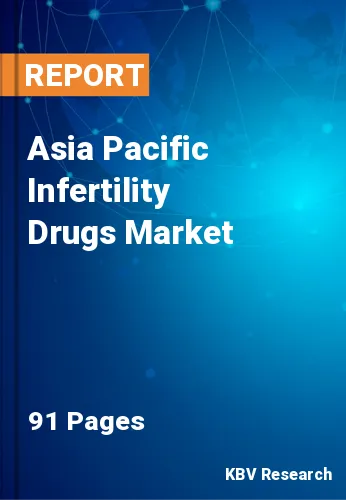The Asia Pacific Infertility Drugs Market would witness market growth of 7.0% CAGR during the forecast period (2022-2028).
Women who have trouble becoming pregnant or bringing a pregnancy to term are said to have impaired fecundity, which is a syndrome associated with infertility. In the United States, 1 in 5 heterosexual women between the ages of 15 and 49 who have never given birth are unsuccessful in becoming pregnant after a year of trying (infertility). Additionally, 26% of the women in this group report having trouble becoming pregnant or bringing a pregnancy to term (impaired fecundity).
Women who have given birth one or more times before are less likely to have infertility and reduced fecundity. Approximately 6% of married women in this demographic, who are between the ages of 15 and 49, are unable to conceive after a year of trying, and 14% have trouble becoming pregnant or bringing a baby to term.
The likelihood of a woman conceiving twins, triplets, or other multiples is increased by several reproductive medications. Multiple pregnancy might cause a woman's pregnancy to be more problematic. Premature birth is more likely in situations with multiple foetuses (too early). Premature infants are more likely to have health and developmental issues. Drugs for infertility become necessary as a result.
Among women of reproductive age, Polycystic Ovarian Syndrome (PCOS) is one of the most prevalent hormonal illnesses. Women who come with infertility often have been diagnosed with PCOS. As a result of the lack of a clear definition for the illness, the actual prevalence of PCOS is unknown. Worldwide, the prevalence of PCOS ranges from 2.2% to 26%. Prevalence rates in a few Asian nations range from 2% to 7.5% in China and 6.3% in Sri Lanka. Couples have pregnancy problems as a result of the growth of these disorders. As a result, the Asia Pacific region is seeing an increase in demand for infertility medications.
The China market dominated the Asia Pacific Infertility Drugs Market by Country in 2021; thereby, achieving a market value of $365.8 million by 2028. The Japan market is registering a CAGR of 6.3% during (2022 - 2028). Additionally, The India market would showcase a CAGR of 7.6% during (2022 - 2028).
Based on End User, the market is segmented into Women and Men. Based on Distribution Channel, the market is segmented into Hospital Pharmacy, Specialty & Retail Pharmacy, and Online Pharmacy. Based on Drug Class, the market is segmented into Gonadotropins, Aromatase Inhibitors, Selective Estrogen Receptor Modulators (SERMs), Dopamine Agonists, and Others. Based on countries, the market is segmented into China, Japan, India, South Korea, Singapore, Malaysia, and Rest of Asia Pacific.
Free Valuable Insights: The Worldwide Infertility Drugs Market is Projected to reach USD 4.8 Billion by 2028, at a CAGR of 6.2%
The market research report covers the analysis of key stake holders of the market. Key companies profiled in the report include Abbott Laboratories, Bayer AG, Novartis AG, Merck & Co., Inc., Pfizer, Inc., Teva Pharmaceuticals Industries Ltd., Sanofi S.A., Ferring Holdings SA, Organon & Co. and Mankind Pharma Ltd.
By End User
By Distribution Channel
By Drug Class
By Country
Our team of dedicated experts can provide you with attractive expansion opportunities for your business.

